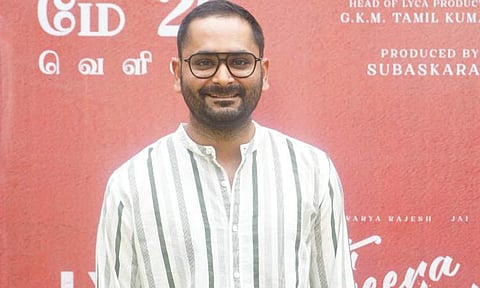

Tales of love are as old as tales themselves. Every shade, stage, and type of love has been through the prism of cinema, colouring our memories, experiences, and our idea of love itself. However, there is one form of romantic love that Tamil cinema has (arguably) not explored enough. The love that lingers post-breakup and after both parties involved have moved into marital union with others. Capturing the complexities of such a relationship and portraying them as anything beyond a sleazy affair, is an understandably tricky road to navigate. “Making a film out of this premise is like walking on the edge of a knife,” confesses Rohin Venkatesan, the director of Theera Kaadhal.
From the reception to the film, it becomes clear that Rohin has managed to successfully navigate the tricky corners of the story. “Right from the writing stage to the trailers and posters, we were conscious of communicating the intent of the story to the audience. I didn’t want the audience to misconstrue the relationship portrayed in the film,” says Rohin. However, he also has a pretty good grasp of how an audience's expectation flows with such films. “Cinema is one tricky medium where the audience wants certain things to happen. In real life, each person might handle this situation in a different way but when it comes to the hero and heroine, the audience will always have an ideal situation in their mind. And they will be disappointed when that doesn’t happen.”
Much has been said about how artistic expression is being occluded by the business end of filmmaking but audience expectations that feed these market restrictions are an unavoidable part of mainstream cinema. Does it then become frustrating as a filmmaker to maintain a unique voice over the cacophony of expectations? Rohin, with a mature acceptance of this predicament, seems to think that an artist should still strive to realise their creative vision. “Just like how society influences a relationship, a film is also influenced by multiple external factors. While working on a film, so many things influence the decisions you make, right from the ideation stage. From the audience to the market, everything tries to shape your film but every creator is trying to bring in their own unique voice despite all these restrictions. That is what we are always striving towards.”
Rohin seems to have applied this understanding while writing Theera Kaadhal with his co-writer GR Surendranath. Elaborating on how he reined in the external influences while writing, the Adhe Kangal filmmaker says, “There are endless possibilities for every scene so we first decided on the plot points we wanted to go to and then wrote scenarios that led us to these plot points. We consciously decided not to do certain things, so as to not stray away from the emotional core of the film.”
Even though the conversation moves towards the inner machinations of Theera Kaadhal’s writing, I couldn’t get my mind off his comment about societal constraints. When probed further, he gave his insight into love and the constraints it faces within the Indian social context. “The film is about a mature relationship between two ex-lovers who don’t necessarily look back on their shared past with disdain. There are so many aspects in the Indian scenario which cause a couple to break up. If you set this story anywhere else in the world, only the people involved in the relationship will be responsible for the breakup. Only in India, do we have multiple factors splitting a relationship apart,” says Rohin. His outlook on external factors affecting a relationship is used as a pivotal plot point in the film. Jai and Aishwarya Rajesh’s characters are driven apart by forces larger than themselves. The film then revolves around what happens when after years of building separate lives for themselves, all their pent-up and dormant love for each other is rekindled by a chance meeting.
With relationship dramas, the most important aspect is definitely the casting. Explaining the process of piecing together the leads of Theera Kadhal, Rohin says, “I first approached Aishwarya Rajesh with the script and she was the one who led me to Lyca Productions and then she was also the one who suggested Jai for the role. Right from day one, she would discuss the scenes and plot points with me. With Sshivada, it was a return to my comfort zone, as I've earlier worked with her in Adhe Kangal. I felt she would be perfect to play the role.”
A relationship drama handling a tricky subject matter either runs the risk of being controversial or becoming too preachy. When asked how he managed to evade both these scenarios, Rohin's clarity and confidence in the story shine through. “We tried not to spout any social message with this film. We just wanted to show how these particular characters managed to handle this particular situation. You can take what you want from the story but if you happen to disagree with it then you’re welcome to do so too,” he smiles. After tackling an out-and-out relationship drama, Rohin Venkatesan is planning to dive into his favourite genre next, an action thriller. “The idea is done. We are reverse engineering the finer details of it from that. It will be bigger in scale and scope than anything I’ve done before,” he promises.